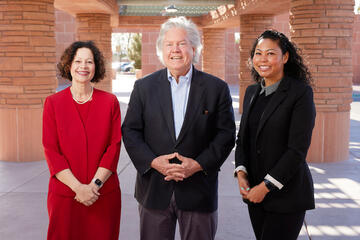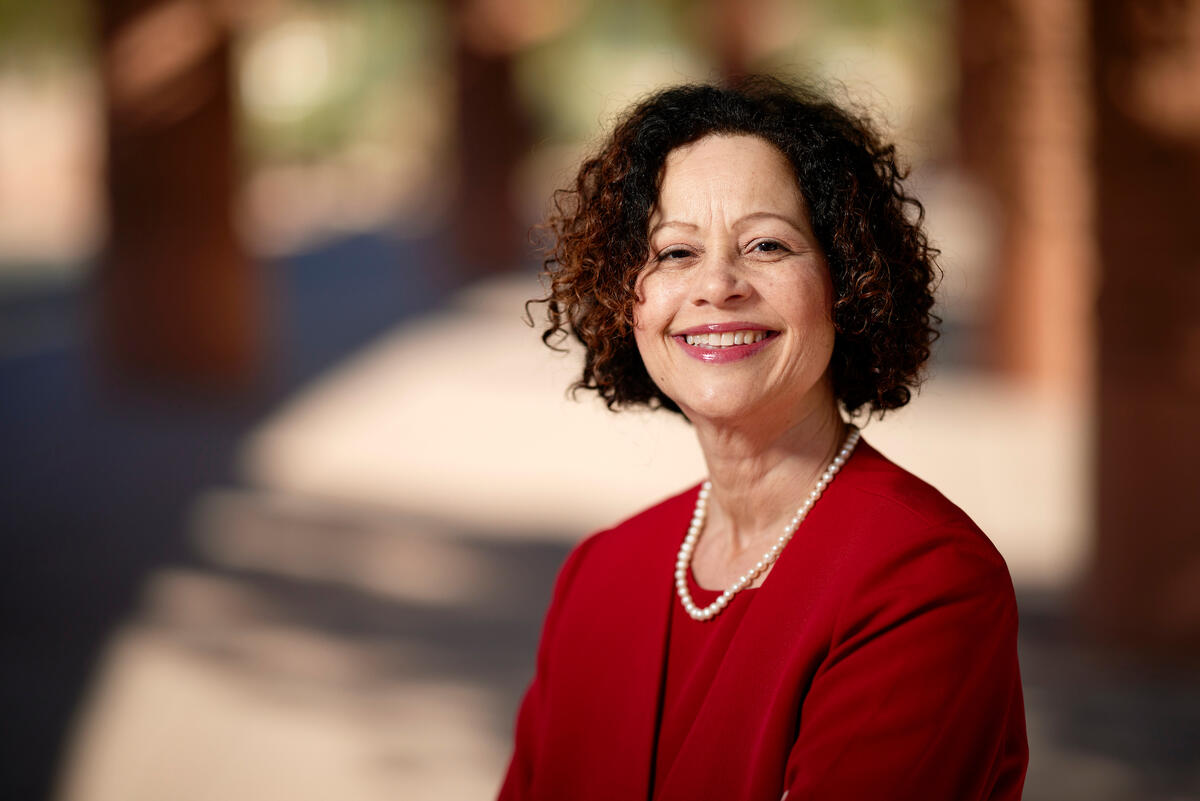After law professor Rachel Anderson finished serving a two-year term as general counsel for the Office of the Nevada Attorney General in January 2021 — where, among other things, she designed and established a formal externship program — she returned to the classroom with an eye toward training lawyers who are prepared to serve in the public interest.
In fall 2022, she taught the Poverty Law and School Change seminar for the first time. Little did she know this one course would lead to so much more after observing the students’ passion for the topic and interest in learning how they could contribute to making positive change.
“In those conversations it became clear to me that this was an opportunity to do more through my teaching to help Nevadans with the greatest economic and social needs,” said Anderson.

Answering the Call: Teaching and Service
Anderson — like her students — feels that pull toward service and human rights issues. She spent her early career after law school as an associate at a U.S. law firm in London working with clients on issues like international human rights laws.
Outside of work, Anderson has volunteered with many community organizations, including Alpha Kappa Alpha, Inc. She has in her professional and personal capacities served on numerous community boards, including the Las Vegas Chapter of the National Bar Association of which she is a past president; Kenny Guinn Center for Policy Priorities Advisory Board; Silver State Equality Advisory Board; Equality California Board of Directors, Las Vegas (NV) Chapter of The Links, Inc.; and Nevada Center for Civic Education Advisory Board. She has also served at the state and national levels on the ACLU and ACLU Foundation boards of directors.
UNLV Poverty Law & Policy Clinic
Combining her love of teaching and serving the community are what led to the establishment of the Poverty Law & Policy Clinic (PLPC), a Thomas & Mac Legal Clinic at the William S. Boyd School of Law in spring 2023. The clinic teaches law students how to use law and policy to help Nevadans with the greatest needs through hands-on learning experiences as student attorneys working with government agencies, elected officials, non-profit organizations, and direct service providers.
PLPC student attorneys, for example, conduct legal and policy research, studies, and analyses, draft legal memoranda, and prepare presentations of the results. They also work on issues that intersect with poverty, including housing, health and mental health, food insecurity and nutrition, education, transportation, disability, environment, voting, internet access, and criminalization.
The clinic is part of a service-learning course, with nine students enrolled in fall 2023 and 10 students enrolled in the spring 2024 semester. The goal is to foster a deeper understanding of the legal and policy landscapes that most profoundly affect the lives of Nevadans with the greatest economic and social needs, provide needed resources to help identify specific ways to reduce poverty and economic insecurity, ameliorate adverse collateral consequences so that more Nevadans can live lives full of opportunity.
Students and faculty involved with the clinic forge and expand relationships with community partners — usually government offices or nonprofits — to help improve conditions and services for Nevadans with the greatest economic and social need.
“Through this experience, students gain an understanding of the dynamics of poverty and develop their legal skills,” said Anderson. “They learn real lessons about engaging with the profession and their community.”
How the Idea Became a Reality
While teaching international law in spring 2023, Anderson discussed the idea of forming a clinic around poverty law and policy with students from her seminar class. Student input was integral to Anderson’s philosophy for designing the clinic. That semester, after the Curriculum Committee approved the course, the work began to put the plan into action.
The first step included getting students and community partners involved.
Student attorneys in the clinic, who are certified by the State Bar of Nevada to practice as student attorneys under the supervision of faculty who are attorneys licensed in Nevada, use legal and policy analysis and other tools to advise public and private decision-makers, and collaborate with community partners. The clinic equips students with skills and knowledge of resources to identify and advise on legal and policy interventions to both alleviate conditions of economic insecurity and prevent people from becoming impoverished.
Anderson established several initial collaborations for the clinic by contracting with the Clark County Department of Social Services, the Children’s Advocacy Alliance; Dallas Harris, state senator, Dist. 11; Melanie Scheible, state senator, Dist. 9; SEIU 1107; Nevadans for the Common Good; ACLU of Nevada,;The LGBTQIA+ Center; and the Senior Law Program.
She secured a five-year contract with the Clark County Department of Social Services, which involves PLPC identifying ways the county could address an array of law and public policy issues that affect housing insecurity in and around the Las Vegas Valley.
Some of the specific projects for the clinic include:
- Identifying tax credits for existing or new multifamily housing developments to allocate units for low or no-income tenants
- Policing of people who are unhoused and the intersection between criminalization and access to safe and secure shelter
- How to incentivize people who are unhoused to access and use services
- Comparative analysis of state and local laws and policies around supportive housing models in different states
Contributing to the Community
Optimistic about the clinic’s future, she hopes to continue to work poverty issues and expand the clinic’s reach throughout Nevada, including providing support for rural and tribal communities. The clinic is already working with two state senators to address issues facing Nevadans with the greatest economic need.
“We are a resource amplifier and expander. I believe that is part of our role,” Anderson said.
With state Sen. Melanie Scheible, the clinic is addressing issues of menstrual poverty and lack of availability of menstrual hygiene products to those Nevadans with greatest economic and social needs in conjunction with a Nevada state law recently passed with bipartisan support.
With Sen. Harris, student attorneys in the clinic are examining implementation issues related to a law passed a few years ago regarding data collection about fines assigned during traffic stops, possible disparities in who receives those fines, and the financial effects of such disparities.
The clinic is also providing policy assistance to the Children’s Advocacy Alliance to work on issues relating to child mental health, child food insecurity and nutrition, and child housing insecurity.
“I hope these projects help produce meaningful change in our communities and throughout the state,” Anderson said.



